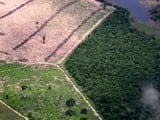



Some coupled land–climate models predict a dieback of Amazon forest during the twenty-first century due to climate change, but human land use in the region has already reduced the forest cover. The causation behind land use is complex, and includes economic, institutional, political and demographic factors. Pre-eminent among these factors is road building, which facilitates human access to natural resources that beget forest fragmentation. While official government road projects have received considerable attention, unofficial road building by interest groups is expanding more rapidly, especially where official roads are being paved, yielding highly fragmented forest mosaics. Effective governance of natural resources in the Amazon requires a combination of state oversight and community participation in a ‘hybrid’ model of governance. The MAP Initiative in the southwestern Amazon provides an example of an innovative hybrid approach to environmental governance. It embodies a polycentric structure that includes government agencies, NGOs, universities and communities in a planning process that links scientific data to public deliberations in order to mitigate the effects of new infrastructure and climate change.
Download: http://rstb.royalsocietypublishing.org/content/363/1498/1889.full.pdf+html
This post was published on 19 de outubro de 2008
Título Índice de Progresso Social Brasil 2025 Autores Melissa Wilm Daniel Santos Beto Veríssimo Marcelo…
Amorim, L., Ferreira, R., Dias, M., Souza Jr., C., & Veríssimo, A. Sistema de Alerta…
Título Relatório Anual do Desmatamento no Brasil - RAD2024 Autores Carolina Del Lama Julia Shimbo…
Título Fatos da Amazônia 2025 Autores Daniel Santos Manuele Lima Agatha Vilhena Beto Veríssimo Caíque…
Amorim, L., Ferreira, R., Dias, M., Souza Jr., C., & Veríssimo, A. Sistema de Alerta…
Título A Vocação da Restauração Florestal na Amazônia com Base na Vegetação Secundária Autores Jayne…